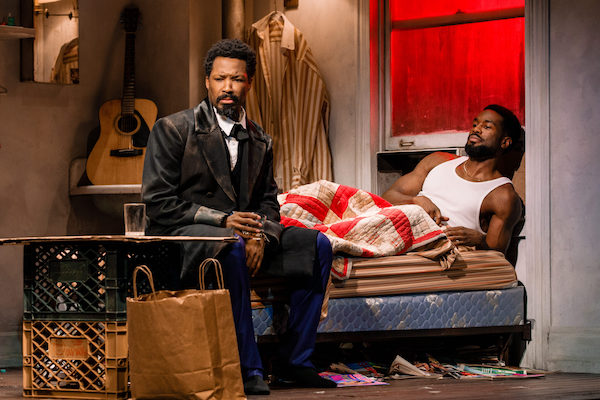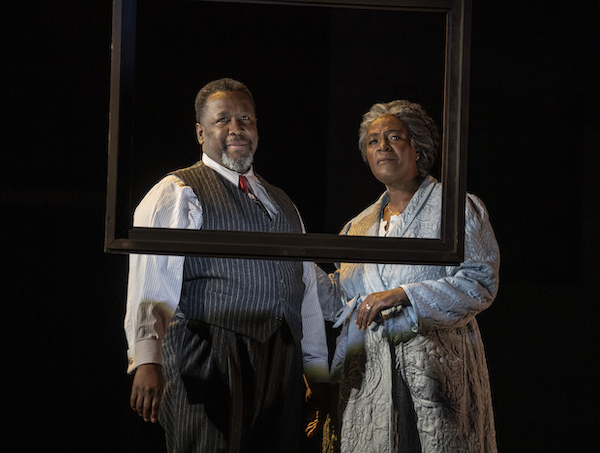Theater Reviews: On Broadway, “Topdog” Sizzles While “Salesman” Slogs
By Christopher Caggiano
In Broadway revivals, Topdog/Underdog is absolutely riveting, while Death of a Salesman feels forced and unconvincing.

Yahya Abdul-Mateen II and Corey Hawkins in Topdog/Underdog at the Golden Theater. Photo: Marc J. Franklin
One major theme that has emerged during this Broadway season has been plays that explore the Black experience, whether as intended by the playwright (The Piano Lesson, Ain’t No Mo’) or as induced through casting and direction (the musical 1776).
Falling into the former category, we also have Suzan-Lori Parks’s Pulitzer Prize-winner Topdog/Underdog, and into the latter we have the most recent revival of another Pulitzer winner, Arthur Miller’s Death of a Salesman. Both plays are about the American Dream, specifically, about how the American Dream is flawed. Or perhaps how it doesn’t apply to everybody. Or even how the American Dream is a lie, a cruel hoax intended to implant hope in the minds of the hopeless.
While this caustic theme has always been present in Salesman, the new Broadway production provides a poignant emphasis to this point, and significant notes of racial inequity, by giving these classic roles to Black performers. Whereas with Parks’s Topdog/Underdog, racial disillusionment is part of the very DNA of the piece.
The current Topdog production represents the 20th anniversary of the play’s Broadway debut. Has much changed in two decades? Sadly, no, as Parks’s piece feels as shockingly relevant as it did in 2002.
The play is a harrowing two-hander concerning two Black brothers, a postmodern Lincoln and Booth. Literally, these characters are named Lincoln and Booth. Lincoln ekes out a meager living at an arcade dressing up as his namesake in whiteface and allowing members of the public to pretend to shoot him in effigy. Booth is currently not gainfully employed, surviving by “boosting” everything he needs or wants from seemingly any store he steps into. But he dreams of going into business with his brother, a former three-card monte master who has sworn off the cards.
If you think about who these two men represent, you can probably figure out where this is headed. But this play is not so much about the admittedly shattering denouement as it is about the harrowing journey. Much of the tension comes from the inheritance the men received from their parents, who each in turn abandoned the two boys. Lincoln has already squandered his inheritance, but Booth is holding onto his for some vague notion of a better future.
Beyond the symbolic premise, there’s also tremendous humor and humanity in Parks’s writing. Although the monte sequences are dazzling, the real sleight-of-hand to admire here is from the playwright, who continually throws us off guard, distracts us, lulls us into thinking we know what’s going on, only to pull the rug out at numerous points. Parks is abetted handily here by the taut direction of Kenny Leon, who brings both biting wit and heartrending empathy to the proceedings.
There’s a riotous gamesmanship in Parks’s dialogue, as stylized as anything from a restoration comedy, but very much in a modern idiom. There’s so much musicality in her words, so much cadence in her dialogue, that you’d be excused if, looking back on the experience, you thought you had seen a rap musical.
To truly experience the impact of Parks’s play, we need to look beyond the lies and the bluster of these characters to see the trauma roiling just beneath the surface of these two young men: abandoned as boys, they are fighting to find a place in the world, often heedless of conventional morality. Parks alternates between the specifics of one-upmanship between the brothers and the horrors of the endless cycle of violence in America.
One of the most compelling reasons to see this production is to witness the dazzling performances from two masterful performers who are clearly enjoying the material. Corey Hawkins is absolutely mesmerizing as Lincoln, producing one of the most layered and richly realized performances I’ve ever seen.
Hawkins’s feat is especially remarkable given that this was the same actor who played the slick, faux-erudite con man from the 2017 revival of Six Degrees of Separation. He’s almost unrecognizable, it’s such a total transformation. Hawkins gives the most electrifying performance of the Broadway season so far, followed closely by that of John David Washington as Boy Willie in The Piano Lesson.
As Booth, Yahya Abdul-Mateen II is more of a slow burn. It’s not really until the end of the play — as we see Booth’s character start to unravel — that we see the true power and layers of Abdul-Mateen’s performance, and it’s shattering to witness.

Wendell Pierce and Sharon D Clarke star in the revival of Arthur Miller’s Death of a Salesman at Broadway’s Hudson Theatre. Photo: Joan Marcus
Making significantly less dramatic impact, we have Death of a Salesman, rather stiltedly directed by Miranda Cromwell. As with the current lackluster revival of 1776, we have a classic show cast predominantly with actors of color. However, as co-directors Diane Paulus and Jeffrey L. Page discovered with 1776, divergent casting alone doesn’t make your production revolutionary or or all that effective.
At first the dialogue seems an odd fit for these performers, but eventually Wendell Pierce as Willy Loman and Sharon D. Clarke as his wife Linda warm up to the material and make it their own. Clarke has more to work with here than she did with the title character in Caroline, or Change. I’ve always found Caroline frustratingly cold and impenetrable. Here Clarke gets to revel in Linda’s anger and compassion. Pierce brings all the bluster and bewilderment we expect from Willy, perhaps at the expense of the tenderness and regret.
Unfortunately, Khris Davis as Biff and McKinley Belcher III as Happy never quite settle into the genre nor the rhythm of the dialogue. It pains me to say this because Davis, at least going on his masterful performance in Sweat, is a performer of tremendous depth and nuance. But here he feels at sea, as if he’s not quite sure who Biff is, or how he should embody him. I was always aware that I was watching a performance rather than witnessing a human being’s experience.
Much of the problem here comes from the artifice of Cromwell’s staging. The stage design has all the set pieces suspended by wires and flying in and out during scene changes, a rather heavy-handed metaphor indicating that the characters’ lives are hanging by a thread.
But the pretense also extends to the arch stylization of the flashback scenes, a term that Cromwell takes quite literally with flash camera effects and slow-motion staging. You get the sense that Cromwell is actively trying to make this Salesman modern and avant-garde, but the ministrations only serve to distance the audience from the emotional stakes of the piece.
Perhaps the most quizzical directorial choice comes in elevating Willy’s brother Ben, played by the redoubtable André De Shields, into a sort of second lead. Ben’s scenes take on a sort of ethereal choreography, with De Shields channeling a sinuous combination of his “viper” character from Ain’t Misbehavin’ and Hermes from his recent Tony-winning turn in Hadestown.
Ben becomes so prominent in Cromwell’s staging that, during the curtain call, De Shields gets the third-to-final bow, after the typically more prominent performers playing Biff and Happy. It seems clear this was in response to his well-earned Tony win; no disrespect to this marvelous performer, but any high school sophomore can tell you that Ben Loman is not the third lead in Death of a Salesman.
Both Topdog and Salesman run through January 15, 2023. Topdog is vital, raw, and unmissable. Salesman isn’t.
Christopher Caggiano is a freelance writer and editor living in Boston. He has written about theater for a variety of outlets, including TheaterMania.com, American Theatre, and Dramatics magazine. He also taught musical-theater history for 16 years and is working on numerous book projects based on his research.
